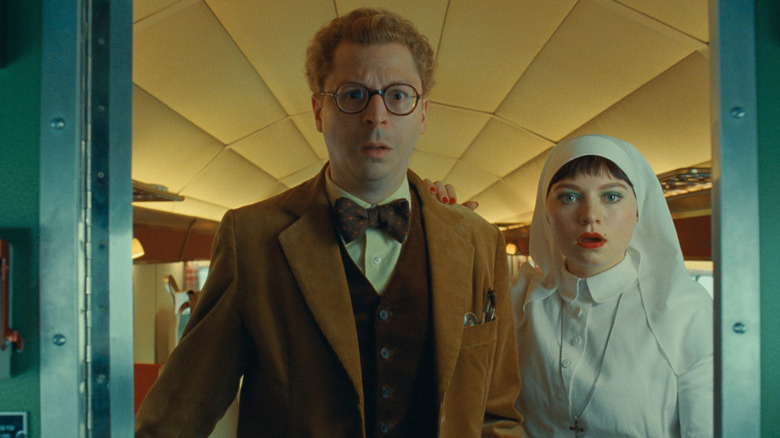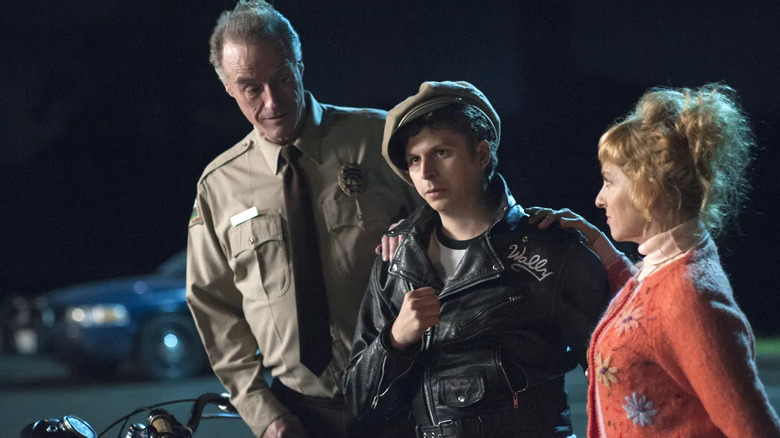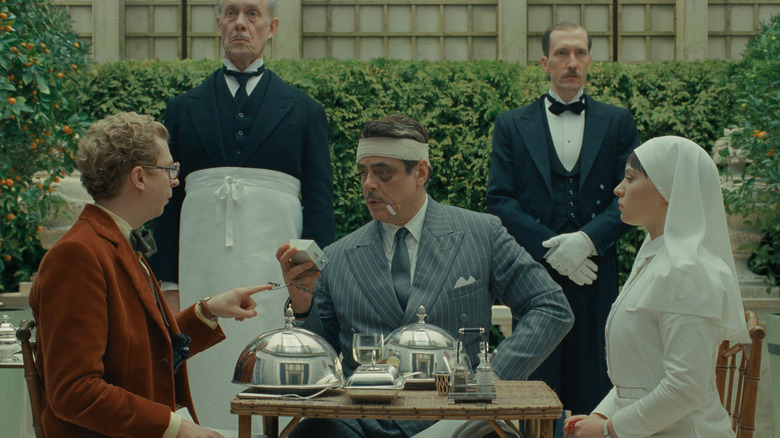Michael Cera's Phoenician Scheme Role Echoes His Most Underrated Character
Ever since actor Michael Cera broke out in 2007's "Superbad," there's been a delightful tension surrounding his screen persona: Is this guy a huge dork, a super chill cool dude, or somehow both? Of course, the latter choice is the answer, but that hasn't stopped Cera from leaning into his more mercurial, enigmatic qualities as a performer. From the bumbling awkwardness of George Michael Bluth in "Arrested Development" to the titular kung-fu fighting hipster hero of "Scott Pilgrim vs. The World" to perfectly encapsulating the offbeat qualities of Allan in "Barbie," Cera has demonstrated many times over that he understands the irony inherent in his persona. This has led to more deliberate and pointed depictions of that irony, such as playing an unhinged version of himself in "This Is the End," and a dual role in "Youth in Revolt," where Cera's shy character creates an outgoing, "cool" alter ego.
All of this led to Cera's teaming up with two of the most distinctive auteur filmmakers who've ever lived: David Lynch and Wes Anderson. In both cases, it feels like Cera's collaboration with them was a long time coming, as the actor's vibe and sensibilities fit so well with each filmmaker. That may sound strange, given how disparate Lynch and Anderson's visual styles are, but there's some overlap in the way each director makes use of ironic, deadpan, non-sequitur humor. For Lynch, this humor serves his absurdism and surrealism; for Anderson, it helps him depict high-stakes events and raw emotions with meta detachment. As it happens, Cera's strengths as a performer dovetail perfectly with both approaches.
Perhaps this is why Cera's appearances in the third season of Lynch's "Twin Peaks" and in Anderson's latest film, "The Phoenician Scheme," are so alike. It certainly helps that both Lynch and Anderson are riffing on the iconography of the 1950s (Lynch obliquely, Anderson directly). Yet the biggest connective tissue is Cera's presence, and there's no doubt that his turn as Bjørn Lund of "Phoenician Scheme" recalls his performance as Wally "Brando" Brennan in "Twin Peaks."
The dorky coolness of Wally Brando
In "Twin Peaks," Cera portrays Wally, the son of Lucy (Kimmy Robertson) and Andy Brennan (Harry Goaz). The character contains an element of cheekiness even before one consider's Cera's performance, as he's partially a payoff to a comedic subplot from the second season, in which Lucy finds herself pregnant but isn't sure if the father is Andy or Dick Tremayne (Ian Buchanan). While Wally's appearance doesn't definitively answer that mystery, it does confirm that, as far as he and his parents are concerned, Andy is his father.
Decked out like Marlon Brando in "The Wild One," Wally speaks to Sheriff Frank Truman (Robert Forster) in a '50s patois that is pitched between cool and bizarre. While Lucy and Andy fawn over their son as if he were the hip, slick man he's behaving like, Truman is less than convinced. It's another delightful instance in Lynch's work where, instead of presenting something weird and solely letting the audience decide upon its strangeness, he allows a proxy character to comment on how odd it is.
With Wally, Cera fuses the two ends of his spectrum, making the character seem ridiculously dorky while nevertheless coming off genuinely cool. In the same vein as Special Agent Dale Cooper (Kyle MacLachlan), Wally may be another instance of Lynch poking some fun at himself. The filmmaker and sometime actor knew full well that his real life persona struck most as odd, and yet so many loved him for that very persona regardless. Similarly, Cera has understood throughout his career how to lean into the public perception of himself, and Wally feels like one of the best, most entertaining, and most memorable instances of this.
Lynch and Anderson's roads rise up to meet Cera's wheels
In "The Phoenician Scheme" (read /Film's review here), Cera recalls his work in both "Twin Peaks" and "Youth in Revolt," playing a dual role. For the first half of the film, Cera is Bjørn Lund, a Norwegian (with a very pronounced accent) who has been employed by industrialist Zsa-zsa Korda (Benicio del Toro) in order to tutor him in his field of expertise, entomology, as part of Korda's voracious interest in literally learning new things while on the job. Eventually, the bashful, easygoing exterior of Lund begins to crack, especially regarding his clear infatuation with Korda's daughter, the nun Liesl (Mia Threapleton).
After a near-fatal plane crash, Bjørn reveals that he's actually a spy for the United States government — an American who was recruited by the intelligence community after they promised they'd fund his entomology studies. Anderson and Cera work in conjunction to draw attention to the dual nature of the character; though he insists that he's not all that different as his true self from his faux persona, the director and actor completely change Bjørn's look and demeanor. Ironically, this new Bjørn hews close to Wally Brennan, similarly exuding a cool 1950s vibe.
Cera's turns in both "Twin Peaks" and "The Phoenician Scheme" not only represent how perfectly he fits into the worlds of Lynch and Anderson, but also how those filmmakers gave Cera material that he was incredibly well-suited to. Sadly, Lynch's passing means that Wally will stand alone as a brief meeting between filmmaker and actor, but one hopes that "Phoenician" marks the first of many future Anderson/Cera collaborations. Not to be a huge dork, but I think that'd be pretty chill and cool.


